Horse feeding
By: Virginia Imberti Posted: 10/02/2021
How to feed horses the right way?
Horses are herbivorous animals with a delicate digestive system. Knowing how to feed horses correctly is fundamental to avoid the occurrence of diseases such as colic, astrogliosis, gastritis, tympanism, among others.
Since the equine stomach is very small, it is only capable of processing small quantities of food and, therefore, it’s convenient to give horses small portions of food at short time intervals.
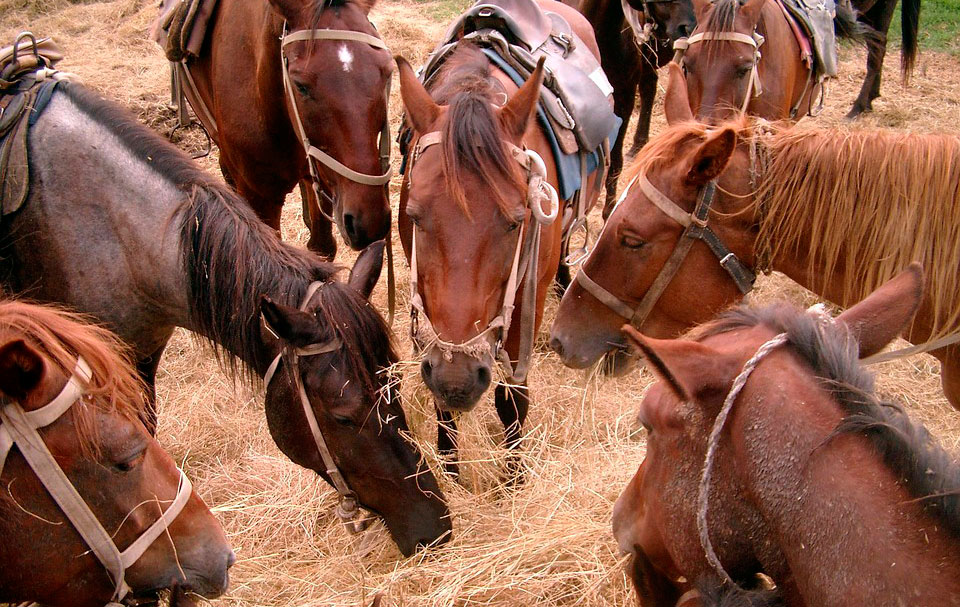
Likewise, the correct rationing of food that a horse may need will be determined by many different factors, like physical activity, physical needs, breed, teeth, age, and the physical space where they live.
An example of what was mentioned before can be seen in the following situations: If a horse makes an effort that entails a physical exhaustion, its diet will be in accordance with its physical activity.
If it is an aging horse, it has probably lost its capacity to absorb nutrients such as proteins due to the loss of efficiency in the digestive tract. In this case, what should be done is to give the horse a larger amount of nutrients that can be easily absorbed.
What do horses eat?
As we said at the beginning, every horse’s diet is based on grass. But, among them, there are differences and, depending on the purpose that each horse has, it will have to follow the diet that suits its needs best.
According to its purpose, horse diets can be divided into three categories: with pasture, with hay or with concentrate feeds.
Pasture
It is common sense to say that horses eat grass, because it is the weed they can easily have access to in fields, ranches or open spaces. But not all types of grass are useful for a horse. Many times, grass could be contaminated or even in bad conditions, which could affect the metabolism.
Hay
This grass, together with pasture grass, is one of the most natural ways to feed horses. Hay includes various grass or legume species, and it is the result of cutting, drying and using such plants as foodstuff for animals.
In those regions where the climate is dry and hot, hay is made of very dry, rough grass, which has very little nutritional value. In such case, it is advisable to combine it with other grass types or grains in order to complete the horse’s nutrition.
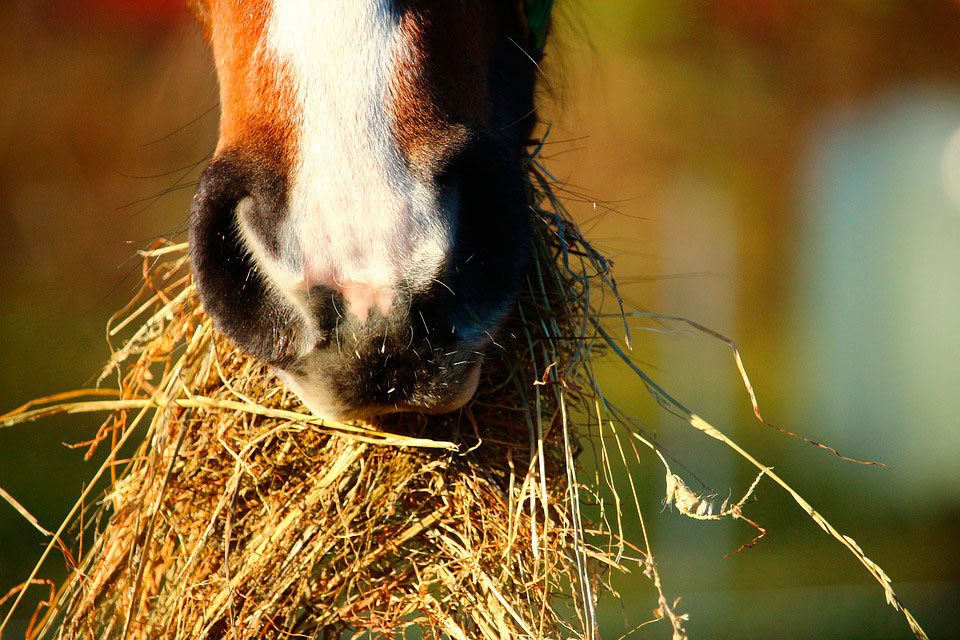
It is also important to make sure that the hay is free of dust and mould, because if horses eat mouldy hay, they can have colic as well as breathing problems. To avoid these situations, you can soak the hay before feeding your horse.
There are three basic types of hay: grass hay, alfalfa hay, and the mixture of grass and alfalfa. Some think that one of the best ways to feed a horse is combining alfalfa and pasture, and that is why the combination of timothy hay, brome grass and alfalfa is so common.
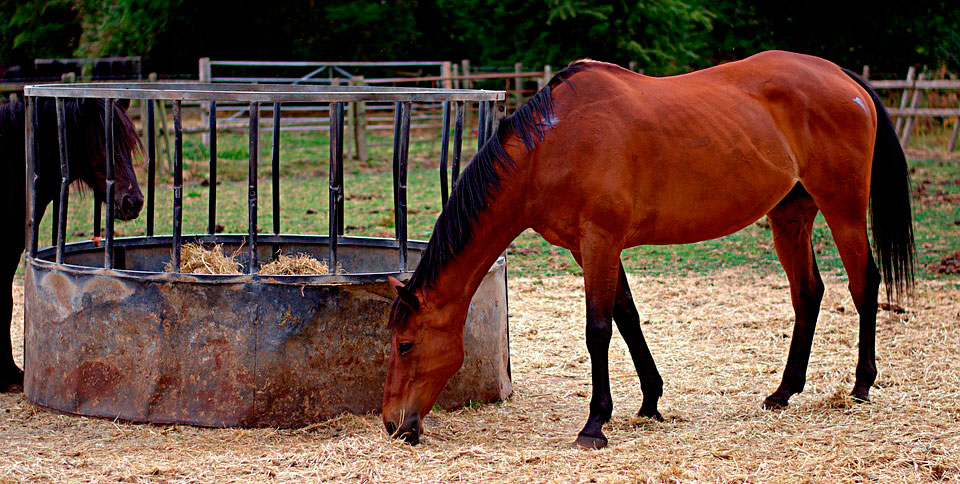
Concentrate feeds
To compensate for the deficiencies caused by grass and hay, concentrate feeds are produced for those hard-working horses and pregnant or lactating mares. Some examples of concentrates are cereals, sweets and manufactured foods. Such feeds can be bought in bags, developed for each stage of a horse’s life, whether it be a foal in a developing stage or an adult horse.
In turn, concentrate feeds or supplements can be classified into:
-
Energy boosters
- Grains: oats, maize, barley, wheat, flax, etc.
- Fats: vegetable oil (maize, soybean or sunflower), animal fat.
-
Bulking
- Brans (wheat or maize).
-
Protein feeds
- Flours: soy, sunflower, etc.
- Meat flour.
- Fish meal.
- Dairy by-products.
-
Commercial or balanced feeds
- Complete feed.
- Supplementary feed.
- Mineral feed.
- Vitamin-mineral feed.
-
Additives
- Vitamins.
- Minerals.
- Vitamin-mineral additives.
- Others: molasses, carrots, yeast, etc.
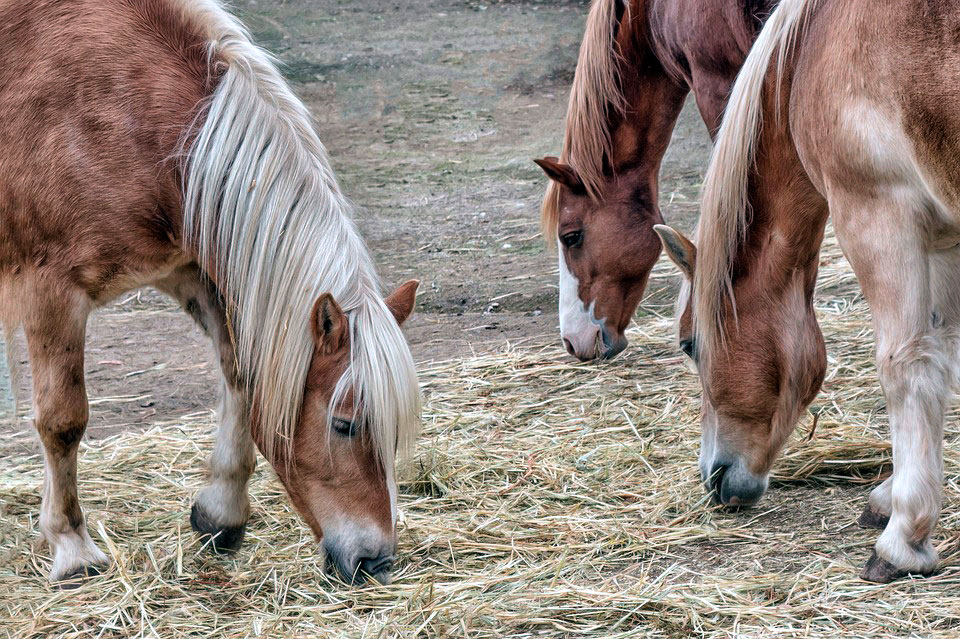
Would you like to be part of a group with an equestrian soul?
Join the Ampascachi Community. Obtain exclusive benefits for your holidays.
We tell you how to start, train and take care of your horse.
Interviews with direct providers of riding tours around the world.
Opinions of outstanding equine scientists and personalities in the equestrian sport world.
What nutrients does a horse need?
As mentioned before, the amount of nutrients will depend on many different factors, such as weight, age, teeth, or the physical activity the horse does. Nevertheless, there are a number of nutrients that must be always present in a balanced diet.
Vitamins
Vitamins are essential to strengthen the immune system and to ensure the right functioning of the equine organism.
The vitamins that horses need are classified into two big groups: water-soluble and fat-soluble vitamins. The most important ones are: vitamins A, D, E, K and the B-complex. Some of these vitamins can be obtained by adding them to the daily fodder, while others are metabolized by the horse’s own organism when grazing or by exposing itself to sunlight and being outdoors.
Vitamin A is important for normal vision, reproduction and the birth of foals. It is found in its provitamin form in horse fodder. A lack of this vitamin can cause embryonic mortality.
Vitamin D plays a key role in the regulation of calcium and phosphorus levels. It is produced in the skin as a response to sun exposure, the same as in human beings. Vitamin D deficiency can cause bone deformities due to the lack of calcium and phosphorus concentrations in the bone.
Vitamin E helps improve immune response and the energy metabolism of horses. Fresh pasture and green fodders are good sources of vitamin E for horses. This vitamin deficiency causes diseases such as the white muscle disease in foals, a degenerative disease of the spine, equine degenerative myeloencephalopathy.
Vitamin K plays an important role in helping the blood clot, preventing excessive bleeding. If there is a deficiency of this vitamin, there could be clotting problems.
Vitamin B2 (Riboflavin) is vital for antioxidant defence mechanisms. This vitamin for horses can be found in larger concentrations in legumes like alfalfa and, in smaller quantities, in cereals.
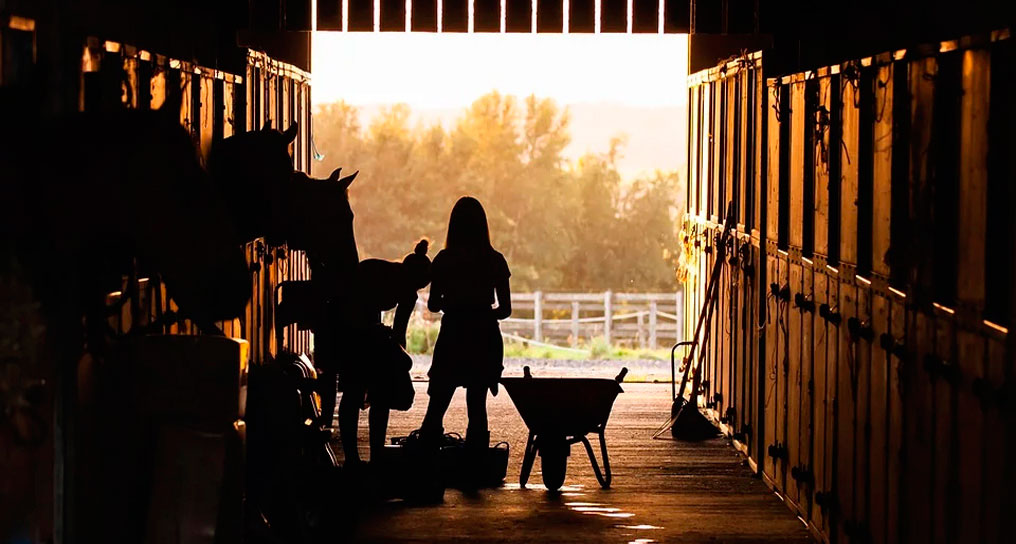
Proteins
As regards proteins, there are some essential amino acids like lysine, vital for efficient growth. This substance must be included in the horse’s diet via soybean flour or flax and legumes (alfalfa, clover, etc.).
The main function of protein as a nutrient is providing the basic components of tissues, muscles, hormones and enzymes.
Minerals
Horses require several minerals to satisfy a wide range of functional needs, including the skeletal integrity and cell communication.
Minerals can be subdivided into two groups:
- Macro minerals (they are required in relatively larger amounts) include calcium, phosphorous, sodium, potassium, chlorine, magnesium and sulphur.
- Trace minerals (they are required in relatively smaller amounts) include cobalt, copper, zinc, selenium, iron, iodine, etc. Since the presence of minerals tends to vary in horse food, which generally has small amounts of sodium and chloride (salt), it is advisable to give all horses some kind of salt source, such as a salt block.
Subscribe to the Ampascachi Community and obtain benefits and exclusive content. Furthermore, we offer free advice on horses and equestrian tourism.
Water: an essential component in nutrition
Horses need to drink plenty of fresh water in normal conditions, and if they do some activity, you should double that amount, or let them drink until they are satisfied. The lack of enough water could cause colic, dehydration and even death.
On the other hand, the horse’s physical condition is very important (for both water and food consumption). It should be born in mind that a lactating mare requires a larger amount of water in its diet and foals, too.
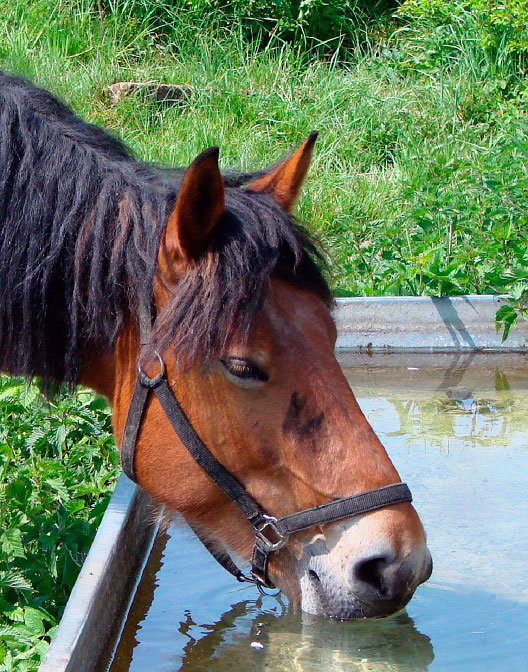
How many times a day should I feed my horse?
The small size of a horse’s stomach requires small quantities of food, and that is why it is better to divide the food in as many portions as possible, and in that way, the horse’s digestion and nutrient absorption will be improved.
We recommend feeding your horse twice or three times a day, when it makes a physical effort (the bigger the effort is, the more you feed it).
The best thing is to keep a regular schedule and to allow for an hour between the horse’s activity and the feeding.
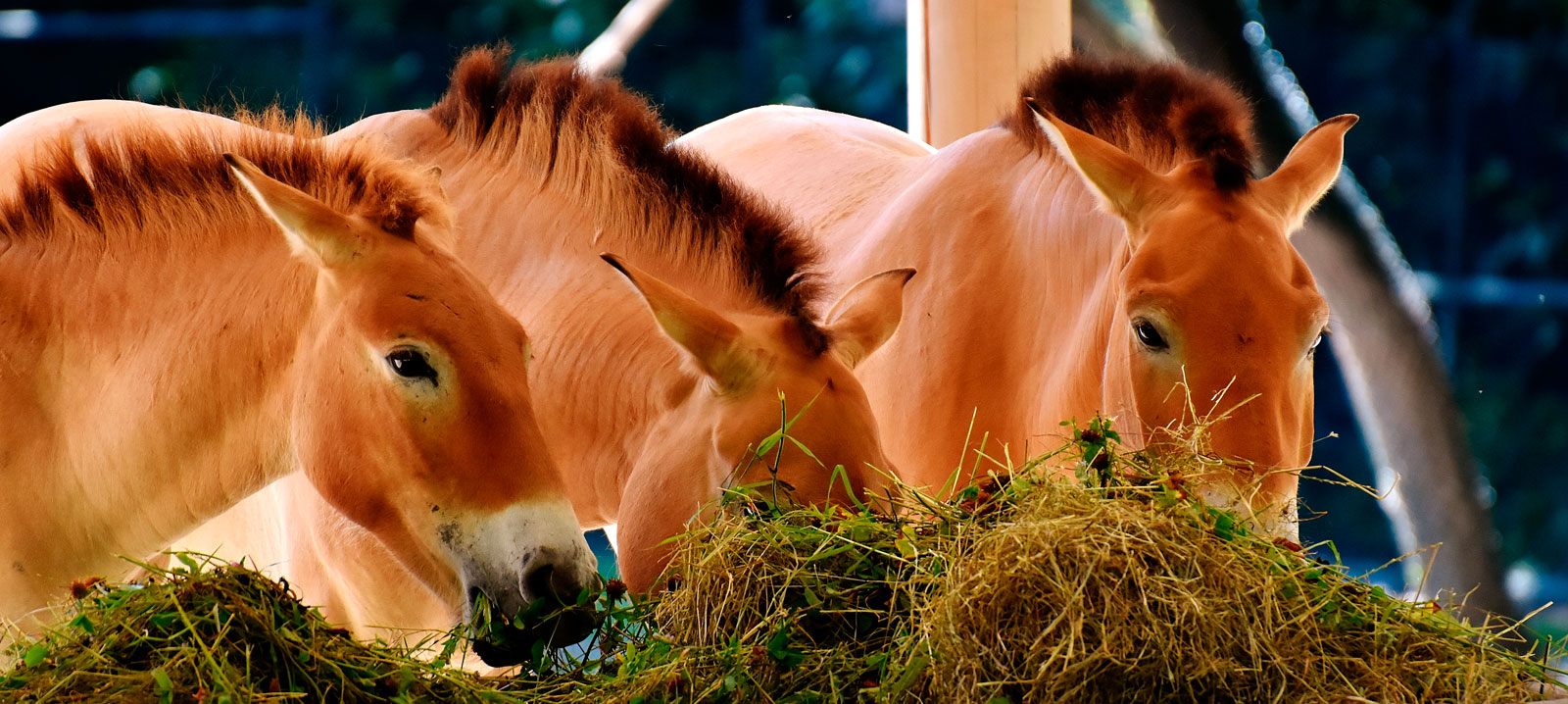
Are you passionate about horses, too? Do you want to learn how to train them?
Download our free ebook Horse training step by step. When you see how your horse learns and begins to understand your signs and aids, you will be filled with joy.
And if you want to be a professional horse trainer and get field-based training, you should check out our training program. You will have the opportunity to live in our equestrian centre and experience our full training process with young horses.
~
THIS COULD ALSO BE INTERESTING
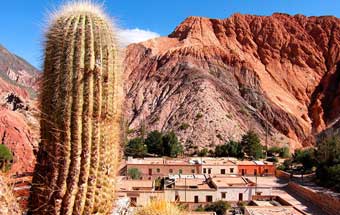
Purmamarca and the Hill of Seven Colours
Purmamarca, a village in the Jujuy Province in Argentina, is situated in the foothills of the Hill of Seven Colours. This colourful mountain is part of the UNESCO World Heritage.
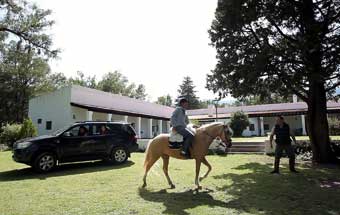
Planning a horseback riding route
You need to take into consideration various aspects when planning a riding route, especially the trails that must be comfortable for riders and horses.
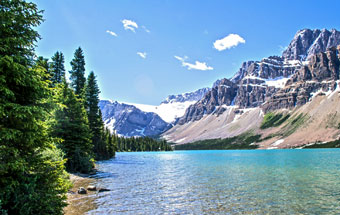
Horse Riding in Banff, Alberta, Canada
Visit the stunning region of Banff in Alberta, Canada, on horseback and explore some amazing trails through its wild forests and the Ghost River with Banff Trail Riders.
~
WHAT IS YOUR OPINION? LEAVE A COMMENT
Your comments
Very interesting, next week I'm going to buy a Criollo horse for riding.
A fantastic article; the truth is that all this information is very useful to learn a little more about horse nutrition. I have recently bought an Andalusian horse – my lifelong dream – and I want to give him the best to keep him strong and healthy. I am using forage in combination with feed concentrates to offer my horse everything he needs. I think I am giving him all you recommend, so I hope I am doing things well. I give him this type of feed https://www.agroanimal.es/19_piensos-pavo, any advice? Thank you for this complete post. Greetings!
I like horses
Excellent recommendations
Planning your horse riding holidays?
Join the Ampascachi Community. You will get exclusive advantages and guidance for your next horse riding holiday.


 German
German French
French Spanish
Spanish